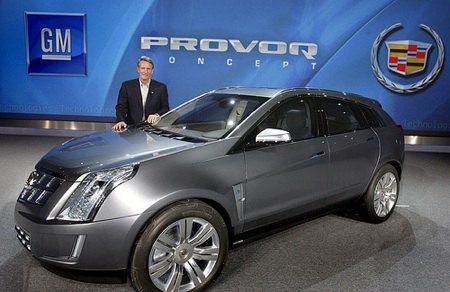SEC Ends GM Accounting Probe. What's the Point?
Indeed. Now that General Motors depends on Uncle Sam for its survival, why would the Securities and Exchange Commission (SEC) levy a fine against the ailing American automaker? Answer: it wouldn’t. Under the terms of the deal with GM [full press release after the jump], the SEC ends its investigation into the company’s bookkeeping without a GM admission of guilt or a cash fine. Oh, and GM pinky swear promises it won’t ever do it again. The settlement and dispensation adds to Rick Wagoner’s growing rep as the industry’s Teflon Don. Lest we forget, Wagoner was GM’s Chief Financial Officer from 1992 to 1998, before becoming Chief Operating Officer (2000) and then CEO (2203). His career at GM (the only career he’s ever had) began as an analyst in the treasurer’s office. If Wagoner didn’t know the books were cooked, why didn’t he?
“The Securities and Exchange Commission today filed settled charges against General Motors Corporation (GM) relating to its disclosures concerning two pension accounting estimates, and its projected cash contributions to its pension plans, as well as errors in its accounting for derivatives and various other transactions. According to the SEC’s complaint, filed in federal court in the District of Columbia, GM violated the issuer reporting, books-and-records, and internal controls provisions of the federal securities laws.
With regard to GM’s pension plans, the complaint alleges that GM made material misstatements or omissions in its 2002 Form 10-K concerning the disclosure of two critical pension accounting estimates – its pension discount rate for 2002 and its expected return on pension assets for 2003.
According to the complaint, GM had stated publicly in an August 2002 pension conference call with analysts that it used a duration matched approach to select its discount rate, but failed to disclose in its 2002 Form 10-K that its use of a 6.75% discount rate was developed from a non-duration matched approach, which was materially higher than the rate developed from a duration matched model. In addition, the complaint alleges that with respect to the discount rate, GM maintained inadequate internal controls to provide reasonable assurance that transactions would be recorded as necessary to permit preparation of financial statements in compliance with generally accepted accounting principles, including a process for reviewing and adopting discount rate recommendations to provide reasonable assurance that the recommendation was developed in a reasoned and unbiased manner.
The complaint further alleges that since at least the mid-1980s, GM’s expected return assumption had never been higher than its most recent 10 year average return. In its 2001 Form 10-K and during the August 2002 pension call, GM referred to its rolling 10 year historical average return of 10% or better as support for the reasonableness of its 10% expected return assumption. In its 2002 Form 10-K, GM did not state that its most recent 10 year average return was below its new assumption set at year-end. According to the complaint, if GM had used an expected return consistent with its 10 year historical average, it would have reduced its 2003 pre-tax earnings by $680 million.
The complaint also alleges that in that same 2002 Form 10-K and in three 10-Q filings, GM failed to disclose material information about the timing and amount of its projected cash contributions to its pension plans to avoid variable rate premiums to the Pension Benefit Guaranty Corporation (PBGC) and the impact such contributions might have on its liquidity and capital resources.
With regard to GM’s other transactions, the SEC’s complaint alleges that GM made material misstatements that included improperly accounting for a $97 million transaction involving the sale and repurchase of precious metals inventory in its 2000 Form 10-K; prematurely recognizing in its 2001 Form 10-K and Q3 2001 Form 10-Q a $100 million signing bonus it received for entering into a railroad shipping contract; and improperly accounting for two types of derivatives contracts – a Canadian dollar mirror hedge strategy and “normal purchase normal sale” arrangements of commodities – in its 2004 Form10-K. The complaint also alleges that GM maintained inadequate internal controls in these areas and maintained inaccurate books and records in connection with these transactions.
GM simultaneously settled the charges, without admitting or denying the allegations, by consenting to the entry of a final judgment permanently enjoining it from violating Sections 13(a), 13(b)(2)(A), and 13(b)(2)(B) of the Securities Exchange Act of 1934 and Rules 12b-20, 13a-1, and 13a-13 thereunder. The settlement is subject to court approval.
The Commission notes the assistance of the PBGC.
The investigation is continuing as to others.”
More by Robert Farago
Latest Car Reviews
Read moreLatest Product Reviews
Read moreRecent Comments
- Steve Biro There are 24 races on this year’s F1 schedule. And I guarantee you no more than two will be reasonably exciting, Meanwhile, F1’s reception for Andretti reveals the dark underbelly of the sport. I have followed F1 since the 1960s and, frankly, I am running out of interest. I’ll catch a race if it’s convenient but won’t bother DVRing them.
- YellowDuck Been watching since the 80s, seriously since the 90s once we had reliable TV coverage. I'm in Canada though. Hey, and don't forget that the Interlagos race is also in a convenient time zone, as is Mexico. So that's 5 races in the Americas. Absolutely love it, but it takes a bit more interest in the technical / strategic side of things to really appreciate it. It's not just going fast in circles until someone crashes into someone else, while drunk people watch. The US can be proud of what it has contributed - Austin is one of the best tracks on the calendar, Vegas turned out to be much better than anyone could have hoped, and even Miami - a real Indy car-style track - produced a good race this year.
- JMII I watch every F1 race, same with Indycar which is 100X better in terms of actual racing.
- Dale Quelle surprise.
- 3SpeedAutomatic Nice looking, but IIRC, there was an issue with these engines where a knock would develop. That may account for the very low milage. 🚗🚗🚗


































Comments
Join the conversation
@scartooth If Americans wanted quality products produced in environmentally sound conditions by a well treated labour force they would have payed a premium for them to be made locally. But Americans would not pay that premium, complained (as they do today) about the high price of grocerries and other goods and therefore companies have to source these goods from countries where they are produced more cheapy by compromising on those very things you claim Americans demand. Would Chevy had sold as many Aveos if they cost as much and were as sparsely equipped as the Mini?
Robert, Do you really think GM (or red-ink Rick)is going to last until 2203?